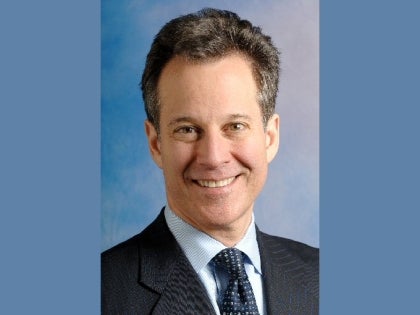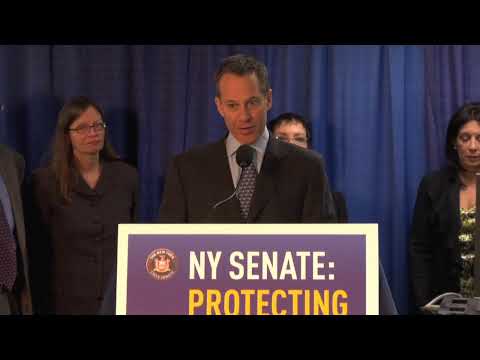
Home For Christmas, Exoneree Endorses “Actual Innocence Act”
Eric T. Schneiderman
December 22, 2009
-
ISSUE:
- Crime
Fernando Bermudez Supports Schneiderman-Espaillat Bill To Help The Wrongfully Convicted
NEW YORK – In his first press conference since being exonerated after serving 18 years for a crime he did not commit, Fernando Bermudez joined State Senator Eric T. Schneiderman (D-Manhattan/Bronx), Assemblyman Adriano Espaillat (D-Manhattan), civil rights advocates and elected officials today to endorse the “Actual innocence Act.” This legislation establishes “actual innocence” as a lawful basis for vacating a prior conviction, giving the wrongfully convicted an opportunity to directly prove their innocence.
"My wrongful conviction struck the very core of my being - it made me question my faith, my purpose and my future existence. An actual innocence law would enable wrongfully convicted individuals to have their claims heard, sooner rather than later, thereby eliminating the untold suffering of procedural delays,” said Bermudez.
Last month, Fernando Bermudez became a free man after serving 18 years in prison for a murder he did not commit. This will be his first Christmas at home since 1991. A Manhattan judge threw out his conviction after a cooperating witness lied in court, and witnesses were improperly allowed to discuss a mug shot of Bermudez before identifying him as the shooter. Each one has since recanted. In a powerfully worded decision, Judge John Cataldo found “clear and convincing evidence” that Bermudez demonstrated his “actual innocence.” Despite the Judge's decision, there is no free-standing ground of actual innocence to vacate wrongful convictions in New York State.
“Fernando’s experience illustrates exactly why we need to reform the criminal justice system to give innocent people locked up in prison a hearing when they can produce evidence conclusively proving they are not guilty. It’s that simple. Had this law been in place in the 1990s, it’s possible that Mr. Bermudez could have been a free man more than ten years ago,” said Sen. Eric T. Schneiderman, who sponsors the bill and represents the Bermudez family in the 31st District. “The Actual Innocence Act is about justice – it ensures that innocent people don’t spend decades behind bars while real criminals go free.”
For wrongfully convicted individuals in these non-DNA cases, current law offers only limited hope for relief by establishing procedural obstacles that can deprive them of having an innocence claim thoroughly heard. The tragic result – as demonstrated in hundreds of DNA exoneration cases throughout the country – is that an innocent person can spend years in jail while the real perpetrator is free to commit more crimes and terrorize countless victims.
The Schneiderman-Espaillat bill (S.5234) creates a freestanding ground of “actual innocence” upon which a criminal court could grant a post-conviction motion to vacate its prior judgment of conviction. The motion can be granted only where a defendant is able to present “reliable and relevant” proof that “conclusively establishes” the defendant’s actual innocence of the crime of which he or she was convicted. To ensure that a defendant cannot benefit from prior inaction or delay aimed at “gaming” the system, the bill would specifically permit the court to deny relief where it determines that the defendant’s failure to act was intentional.
This bill prevents the rejection of innocence claims on technicalities. It is particularly important in cases like this one, where there is no DNA evidence. In the last five years, approximately 64 percent of all the exonerations in the United States were based on non-DNA evidence. Experts observe that the percentage of exonerations based on non-DNA evidence in New York State is only increasing.
"With the significant number of wrongful convictions that have recently been overturned, it has become apparent that many innocent people were convicted and served jail time. This initiative will help justice prevail for individuals and families affected by wrongful convictions,” said Assm. Adriano Espaillat, the sponsor of the bill in the Assembly.
“The release of Fernando Bermudez , based on evidence proving his actual innocence, is a compelling and powerful reason to support this legislation. This bill would finally open the courthouse doors to allow those who are wrongly convicted the ability to prove, without question, their innocence. New York State, in the interest of justice and morality, must provide this right to defendants. I am proud to support this legislation,” said State Senator Thomas K. Duane (D- Manhattan), a co-sponsor of the bill.
“The authority to take away one’s liberty is perhaps the state’s most awesome power. And yet New York’s rules of criminal procedure place an extraordinary burden upon the individual who wishes to put before the court compelling evidence of his wrongful conviction. This bill restores fairness and integrity to the criminal justice system when the evidence indicates the state has put an innocent person – like Fernando Bermudez – behind bars,” said Robert Perry, Legislative Director of the New York Civil Liberties Union.
“Most wrongful convictions occur in cases that lack DNA. Unfortunately, too many courts overlook these cases, focusing more on procedural barriers than the substance of the claims of innocence, no matter how compelling. The result is that the factually innocent continue to languish in jail without recourse. The Actual Innocence Bill seeks to codify the most basic principle of justice: that wrongfully convicted innocent people are entitled to have their cases heard on the merits,” said Glenn Garber, Director of the Exoneration Initiative.
